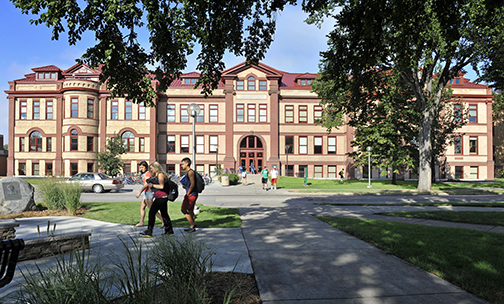
Sociology
This is an archived copy of the 2021-22 catalog. To access the most recent version of the catalog, please visit https://catalog.ndsu.edu.
Program Description
The Department of Sociology and Anthropology offers the M.S. degree in Sociology. This program is based on the principle that graduate level education in Sociology is a desirable preparation for a growing number of career orientations. Sample positions that our graduates have obtained include research analyst, instructor and human service worker. The precise plan of study for each student will be established in consultation with the academic adviser with the student's career goal in mind.
The focus of graduate education in Sociology is directed toward both the development of applied sociologists and the advanced training of those seeking to pursue a doctoral degree. Students may elect to take courses in a specialty area, or they may pursue a background in general sociology. Areas of specialization include medical sociology/gerontology and community development.
The Sociology graduate program provides students with the opportunity to expand their background and perspectives in research methods and theory. Consequently, the first year of the program is designed to expose students to theory and both quantitative and qualitative research methods.
Two program options are available for students. In the thesis option, students work on a research-based thesis. Students typically test theoretical assumptions using primary or secondary data. The comprehensive study option is designed for students who wish to combine their studies with some type of specialized field experience. Students electing this option are required to complete a comprehensive study paper related to their internship, such as evaluating a program.
Students in the Sociology graduate program benefit from a favorable faculty-to-student ratio.
Admissions Requirements
The Department of Sociology and Anthropology graduate program is open to qualified graduates of universities and colleges of recognized standing. In addition to the Graduate School requirements, the applicant must have earned a cumulative grade point average in all courses of at least 3.0 or equivalent and a grade point average of 3.2 or higher in sociology.
Financial Assistance
Teaching assistantships are available to qualified applicants. Research assistantships may also be available, contingent on faculty research funds. Applicants for assistantships are considered on the basis of scholarship and potential to undertake advanced study and research. To be considered for an assistantship, a completed Graduate School application, official transcripts, and three letters of reference must be received by the Graduate School no later than February 15.
Students must complete a minimum of 30 credits and a master's thesis for the thesis option, a minimum of 35 credits and a paper for the comprehensive study option, or a minimum of 35 credits and an exam for the culminating experience. An oral defense of the thesis, the paper, or the exam is required.
Requirements for the M.S. degree in sociology are as follows:
- Successfully complete
Course List Code Title Credits SOC 723 Social Theory 3 SOC 700 Qualitative Methods 3 SOC 701 Quantitative Methods 3 -
Complete an additional 21 credits (including thesis) or 26 credits (including comprehensive study or culminating experience)
-
Complete a research-based thesis, comprehensive study paper, or comprehensive exam and pass an oral defense of the thesis, paper, or exam administered by the student's supervisory committee.
Pamela Emanuelson, Ph.D.
University of South Carolina, 2008
Research Interests: Small Group Processes, Social Psychology, Mathematical Sociology. Economic Sociology, Sociopolitical Evolution
Dane R. Mataic, Ph.D.
The Pennsylvania State University, 2018
Research interests: Mobilization, International Conflict, Social Inequalities, Sociology of Religion, Organizations
Christina D. Weber, Ph.D.
SUNY--Buffalo, 2005
Research Interests: Social Theory, Feminist Theory, Sociology of Gender, Memory and Trauma Studies, Social Change
Christopher M. Whitsel, Ph.D.
Indiana University, 2009
Research interests: Social Inequality, Research Methods, Global Comparative Sociology, Post-Soviet Central Asia
Lecturers
Patty Corwin, M.A.
North Dakota State University, 1972
Research interests: Minorities and Race Relations, Gender, and Service Learning
Leretta Smith, Ph.D.
South Dakota State University, 2007
Research interests: Family, Education, and Gender
